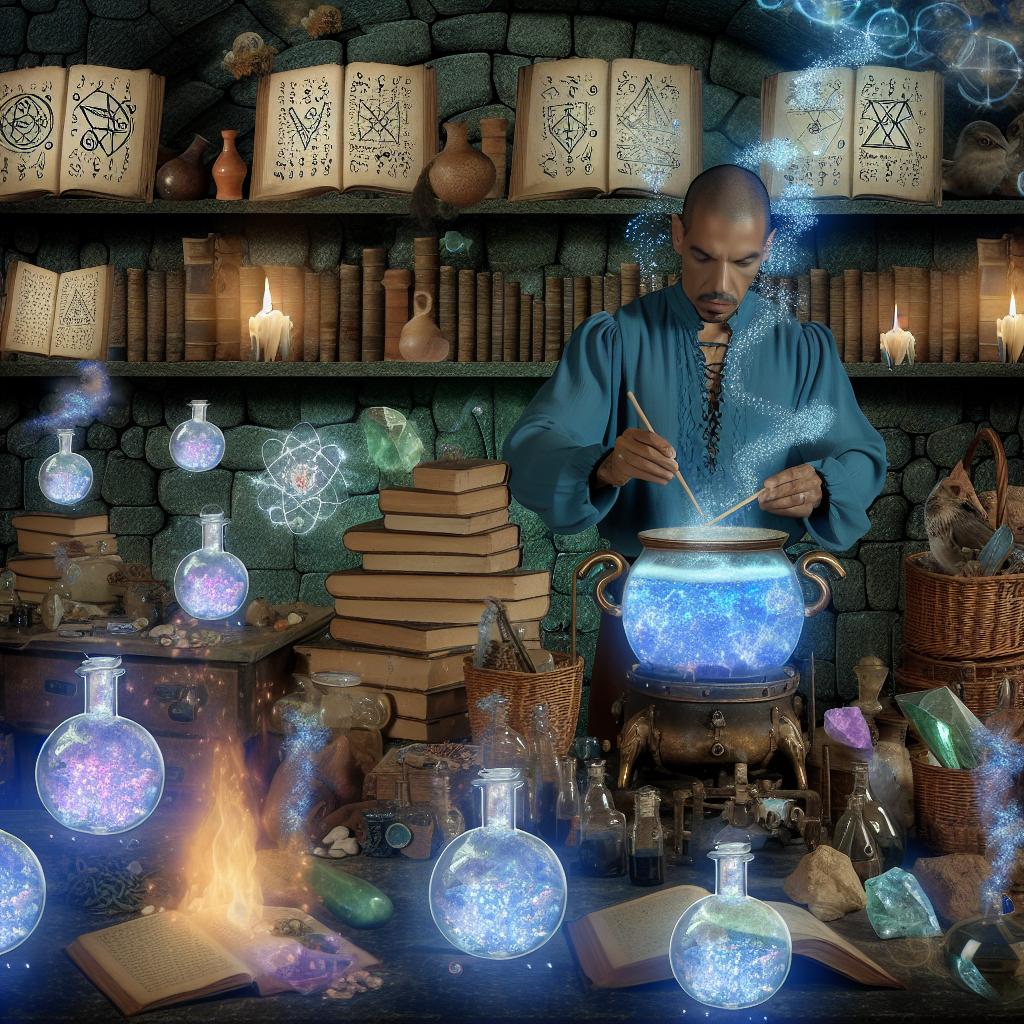The Role of Alchemy in Fantasy Worlds

The Origins of Alchemy
Alchemy, often depicted as a mystical and esoteric pursuit, has deep historical roots. Its origins can be traced back to ancient civilizations such as Egypt, India, and China. In these cultures, alchemy was a precursor to modern chemistry, with practitioners seeking to transmute base metals into gold and discover the elixir of life. In fantasy worlds, alchemy often retains these historical aspects while being embellished with magical properties.
The practice of alchemy in ancient times was not solely about material transformation. It was also intertwined with philosophy and spiritualism. Alchemists viewed the world as a series of interconnected systems, and they sought to understand these relationships to harness the natural forces that govern the universe. In ancient Egypt, alchemy was closely linked to religion and magic. Egyptian alchemists believed that substances contained spiritual properties and that their transformation could lead to spiritual enlightenment.
In ancient India, alchemy was part of the broader philosophical tradition. Indian alchemists were notably advanced in metallurgy and medicine, integrating physical and spiritual wellness. They aimed to perfect the human body, not just by transforming materials but also by maintaining physical health and longevity.
Similarly, Chinese alchemy was focused on achieving immortality and spiritual perfection. Chinese alchemists developed countless elixirs, experimenting with minerals and herbs to extend life. Their practice was also deeply spiritual, rooted in Daoist philosophies. The quest for the elixir of life was not just a physical pursuit but a journey towards harmony and balance with the forces of nature.
Alchemy’s Integration into Fantasy Narratives
In fantasy literature, alchemy serves as a versatile plot device and world-building tool. Authors often use alchemy to bridge science and magic, creating a unique space where empirical experimentation meets mystical elements. This blending allows for the creation of powerful potions, elixirs, and magical artifacts that are central to many fantasy narratives.
Fantasy authors use alchemy to enhance the narrative by adding layers of complexity to the plot and depth to the characters. The process of alchemical transformation symbolizes personal growth and change, making it a powerful motif for character development. Characters who engage in alchemy often undergo significant transformations, both physically and mentally, reflecting their journey and growth throughout the story.
Alchemical processes are also used to create conflict and tension in fantasy stories. The pursuit of alchemical knowledge can lead to both positive and negative outcomes, making it a double-edged sword. This duality presents characters with difficult choices and consequences, enriching the narrative with ethical and moral dilemmas.
Alchemical Symbols and Their Significance
Fantasy worlds frequently employ alchemical symbols, enhancing the mystical aura of this ancient practice. Common symbols include the philosopher’s stone, representing ultimate knowledge and transformation, and the alchemical circle, often depicted as a gateway to hidden powers. These symbols deepen the lore of fantasy worlds, offering layers of meaning for both characters and readers.
The philosopher’s stone is perhaps the most iconic symbol associated with alchemy. In fantasy literature, it is often portrayed as a rare and powerful artifact capable of granting immortality or transmuting any metal into gold. This symbol encapsulates the ultimate goal of alchemy: perfection and enlightenment.
The alchemical circle is another significant symbol, often used in fantasy for rituals and spells. It represents the cyclical nature of the universe and the interconnection of all things. These symbols serve as visual metaphors for the themes explored in fantasy narratives, such as transformation, transmutation, and the quest for knowledge.
Character Archetypes: The Alchemist
In many fantasy settings, the alchemist is a quintessential character archetype. Typically portrayed as a wise, often eccentric figure, the alchemist is tasked with unlocking the secrets of nature. They may serve as guides or mentors to protagonists, providing crucial knowledge and tools (such as potions and transmutation materials) that aid in the story’s progression.
The alchemist as a character often embodies the dual nature of alchemy: both scientist and mystic. They are portrayed as deeply curious and driven by a desire to understand the world. This character archetype is often used to explore themes of knowledge and discovery, as alchemists push the boundaries of what is possible.
In some narratives, alchemists are depicted as outsiders or rebels, challenging the established order with their unconventional ideas and practices. This portrayal adds an element of tension and conflict, as alchemists must navigate societal opposition and skepticism.
Alchemy and Ethical Dilemmas
Alchemy in fantasy also frequently explores ethical dilemmas. The pursuit of forbidden knowledge and the temptation to play god are common themes. Characters may face moral challenges as they grapple with the consequences of their alchemical pursuits. These narratives offer opportunities to explore deeper philosophical questions about the nature of power and the limits of human ambition.
The ethical challenges associated with alchemy often revolve around the consequences of altering natural processes. Characters may struggle with the implications of their actions, particularly when alchemical pursuits result in unintended harm or imbalance. Such dilemmas raise questions about responsibility and the ethical limits of scientific inquiry.
Moreover, the theme of forbidden knowledge is often explored in relation to alchemy. Characters may be tempted to go beyond ethical boundaries in their quest for power or immortality, leading to dire consequences. These narratives serve as cautionary tales about the risks of unchecked ambition and the moral obligations that come with the pursuit of knowledge.
Learn more about alchemy in fantasy settings to delve deeper into how authors craft these fascinating worlds filled with mystery and adventure.
In conclusion, alchemy has a rich history that continues to inspire and captivate writers and readers. Its integration into fantasy narratives allows for a unique exploration of themes such as transformation, knowledge, and ethics. By blending science and magic, alchemy provides a versatile framework for storytelling, offering endless possibilities for imaginative worlds and compelling characters.
Comments are closed.
Comments on 'The Role of Alchemy in Fantasy Worlds' (0)
Comments Feed